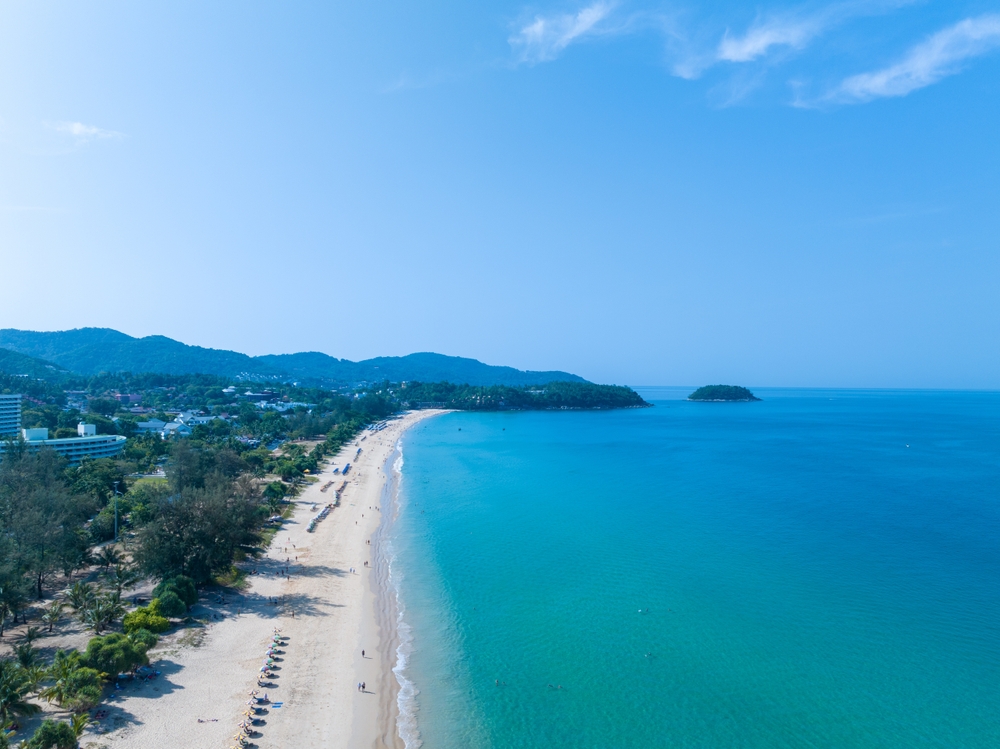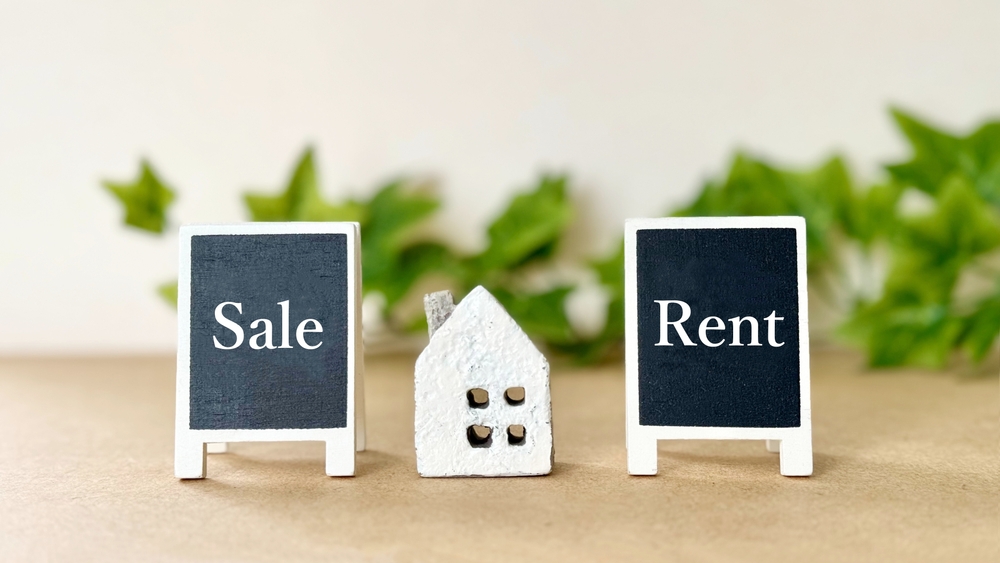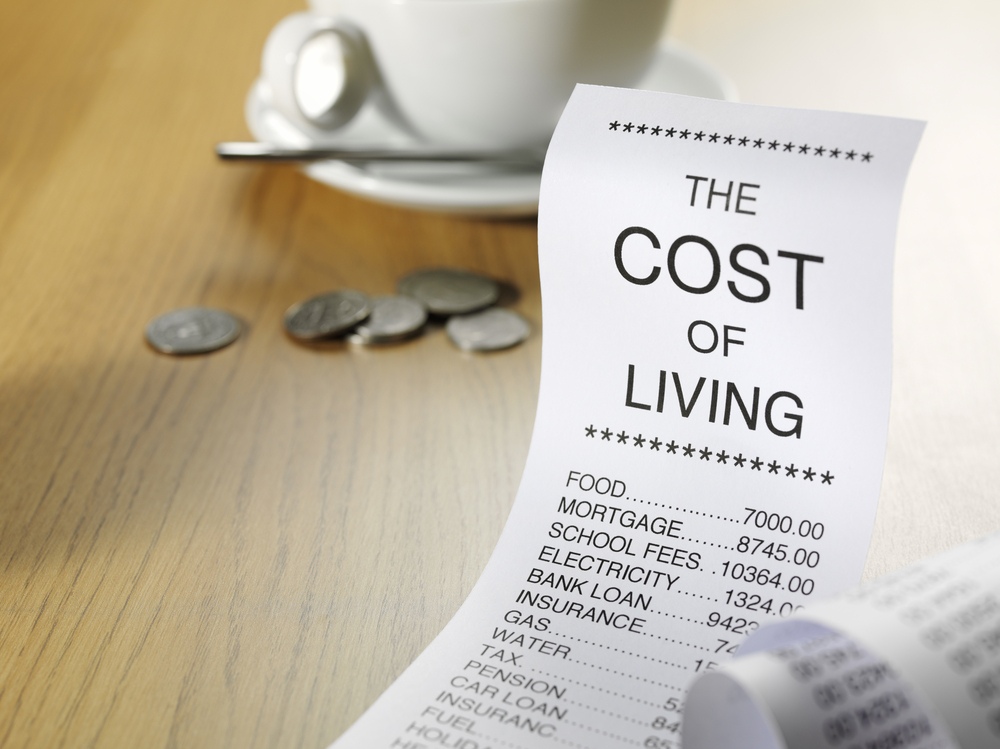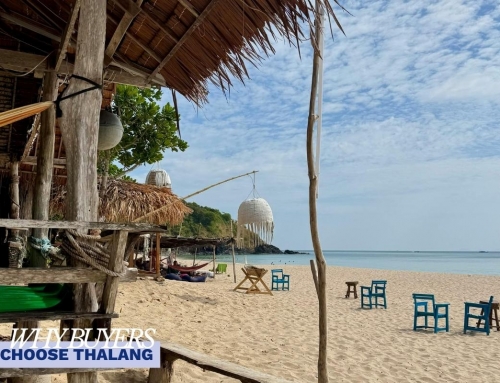Cost of Living in Phuket Overview
Thinking about life on a tropical island often brings up images of palm trees, sandy beaches, and fresh coconuts, but what is the actual cost of living in Phuket? While it’s true that lifestyles vary widely, from budget-conscious expats to high-end villa owners, Phuket offers a spectrum of living costs that can suit almost every pocket.
This guide breaks down the essentials: housing, utilities, food, transport, schools, and healthcare – with examples of monthly budgets so you know what to expect before making the move.
Housing & Rent Costs in Phuket
When considering the cost of living in Phuket, accommodation will be your biggest monthly cost. Prices depend heavily on location, property type, and lease terms.
-
Apartments & Condos: In areas like Kathu or Thalang, modern one-bedroom condos can rent from THB 12,000-18,000 per month, while sea-view or resort-style developments in Kata, Kamala, or Bang Tao often start around THB 25,000-40,000.
-
Villas & Houses: Small pool villas in Nai Harn or Rawai typically begin at THB 35,000-50,000 per month, rising to THB 100,000-300,00 for luxury homes in Laguna, Surin, or Cape Yamu.
-
Long-Term Discounts: Many landlords offer lower monthly rates if you commit to a 12-month lease instead of a short-term rental.
Housing costs are highly negotiable outside peak season (November–March), so timing can also affect your rent.
Utilities & Internet Costs in Phuket
Utility bills in Phuket are generally lower than in many Western countries, but they can swing a lot depending on lifestyle, air-con use, and property size.
-
Electricity: For a one-bedroom condo with moderate air-con, expect around THB 1,500-2,500 per month. Larger villas running multiple units can reach THB 6,000-10,000+ during hot season.
-
Water: Typically inexpensive, often THB 300-600 per month in condos, and slightly higher for villas with pools and gardens.
-
Internet & TV: High-speed fibre packages cost about THB 600-1,200 per month. Mobile data plans are affordable, with unlimited 5G starting from THB 350.
Tip: Many condominiums add a small juristic person fee to cover common electricity, water, and maintenance, usually just a few hundred baht each month.
Food & Groceries Costs in Phuket
Phuket offers a wide range of options, from budget-friendly street food to high-end supermarkets. All of these choices shape the cost of living in Phuket.
-
Local Markets: Fresh produce, seafood, and Thai staples are very affordable. A week’s supply of fruit and vegetables for two people can cost THB 600-1,000 at a local market.
-
Supermarkets: Big chains like Lotus’s, Big C, and Makro are mid-range, while Villa Market and Central Food Hall specialise in imported goods. A trolley with imported cheeses, wines, and Western items can easily double or triple your food spend.
-
Monthly Budget: A couple shopping mostly local can spend THB 8,000-12,000 per month. If you rely heavily on imports, expect THB 20,000+.
Local tip: Shopping at early morning markets not only saves money but also ensures the freshest produce.
Eating Out & Nightlife
Phuket offers a wide range of options, from budget-friendly street food to high-end supermarkets stocked with imported goods, all of which shape the cost of living in Phuket. One of Phuket’s biggest lifestyle perks is how affordable dining out can be compared to Western countries.
-
Street Food & Local Restaurants: A plate of pad thai or fried rice is usually THB 60-100, while a sit-down meal at a mid-range Thai restaurant might cost THB 150-300 per dish.
-
International Cuisine: Italian, Japanese, Indian, and French restaurants are widely available, with mains typically THB 300-600. Upscale dining in areas like Laguna or Surin can reach THB 1,500+ per person, especially with wine.
-
Nightlife & Drinks: A local beer in a bar costs around THB 80-120, while cocktails are usually THB 200-350. Trendy beach clubs and rooftop bars can push drinks higher, especially in Patong, Kata, or Bang Tao.
Lifestyle note: Many expats balance affordable Thai meals with occasional splurges at international spots, making dining out a regular part of life rather than an occasional treat.
Transport & Fuel
Getting around Phuket is a mixed bag – affordable if you’re independent, but costly if you rely on taxis.
-
Motorbike Rental: The most common option for expats. Monthly rentals range from THB 3,000-5,000 for a standard scooter, with petrol adding THB 800-1,200 depending on usage. Buying a second-hand bike outright (THB 25,000-45,000) can be more economical long term.
-
Car Rental & Ownership: Monthly rentals start around THB 15,000-25,000, but owning your own used car reduces costs to mostly petrol (THB 2,500-4,000 per month) plus maintenance.
-
Taxis & Ride Apps: Phuket taxis and Grab cars are relatively expensive compared to Bangkok – a short ride often costs THB 200-400. Long-distance trips (airport to south Phuket) are usually THB 800-1,200.
-
Public Transport: Songthaews (shared trucks) run limited routes, mostly during the day, and cost around THB 40-50 per trip. They’re rarely used by expats outside Phuket Town.
Tip: Many families choose to keep both a car and motorbike – the bike for quick errands and the car for school runs, shopping, and rainy-season convenience.
Schools & Childcare
Education is one of the higher costs for expat families in Phuket, especially if you choose international schools.
-
International Schools: Fees vary by reputation and curriculum. For example, annual tuition can range from THB 200,000-400,000 at smaller schools, up to THB 600,000-800,000+ at top-tier institutions such as British or IB programs. Expect additional costs for registration, uniforms, transport, and extracurriculars.
-
Local Schools: Thai public schools are much cheaper, but few expat children attend due to language barriers and curriculum differences. Tuition can be just a few thousand baht per year, but instruction is almost entirely in Thai.
-
Childcare & Nurseries: Quality nurseries and preschools typically charge THB 8,000-15,000 per month, depending on hours and services. Full-time nannies or domestic helpers usually cost THB 12,000-18,000 per month, plus accommodation if they live in.
Note: Many families factor school fees as their single largest monthly expense, often exceeding rent for those with multiple children.
Healthcare & Insurance
Phuket has a strong healthcare network, with both public hospitals and internationally accredited private hospitals. Costs depend on the level of care and whether you have insurance.
-
Public Hospitals: Affordable but often crowded. A consultation with a Thai doctor might cost THB 200-500, but waiting times can be long.
-
Private Hospitals: High-quality care with English-speaking staff. Expect THB 1,500-3,000 for a standard consultation, and more for specialist visits or procedures. Leading facilities include Bangkok Hospital Phuket, Bangkok Hospital Siriroj, and Dibuk Hospital.
-
Health Insurance: Strongly recommended. Local providers offer basic packages from THB 25,000-40,000 per year, while international insurers can charge THB 80,000-150,000+ per year depending on age and coverage.
-
Dental & Optical: Private dental check-ups start around THB 800-1,200, while new glasses cost THB 3,000-6,000 on average.
Tip: Many expats use a mix – insurance for major hospital care, and direct payments for everyday treatments like dental, physio, or minor check-ups.
Lifestyle, Gyms & Hobbies
Beyond daily essentials, your lifestyle choices will shape how much you actually spend in Phuket.
-
Gyms & Fitness: Basic gyms start at THB 1,500 per month, while premium fitness clubs with pools, classes, and saunas can be THB 3,000-6,000+. Muay Thai camps and yoga studios typically charge THB 300-500 per class, with discounted monthly packages.
-
Sports & Outdoor Activities: Golf is a popular pastime, with green fees ranging from THB 2,500-5,000 per round depending on the course. Diving trips usually cost THB 3,000-5,000 per day. Tennis, paddle tennis, and football clubs have affordable membership rates.
-
Wellness & Spa: Thai massages are inexpensive, typically THB 400-600 for an hour, while spa resorts and luxury wellness centres charge much more.
-
Entertainment & Leisure: Cinema tickets are around THB 200-250, while family outings, beach clubs, or weekend trips to nearby islands can add up depending on frequency.
Lifestyle note: Many expats say Phuket offers far more affordable access to leisure and wellness activities than back home, especially if you take advantage of local gyms, yoga, and massage rather than international luxury brands.

Cost of Living in Phuket: Sample Monthly Budgets
To give you a clearer picture of the cost of living in Phuket, here are a few examples of what different lifestyles might look like in Phuket. Figures are approximate and based on long-term rental rates:

-
Single Professional (Condo Living):
-
Rent (1-bed condo): THB 15,000
-
Utilities & Internet: THB 2,500
-
Food & Groceries: THB 8,000
-
Eating Out & Entertainment: THB 6,000
-
Transport (motorbike): THB 4,000
-
Gym & Hobbies: THB 2,000
-
Total: Approx. THB 37,500 per month (USD 1,000)
-
-
Couple (Pool Villa Lifestyle):
-
Rent (2-bed villa): THB 45,000
-
Utilities & Internet: THB 6,000
-
Food & Groceries: THB 15,000
-
Eating Out & Entertainment: THB 12,000
-
Transport (car + bike): THB 8,000
-
Gym, Hobbies & Wellness: THB 5,000
-
Total: Approx. THB 91,000 per month (USD 2,450)
-
-
Family of Four (Mid-Range in Nai Harn/Rawai):
-
Rent (3-bed villa): THB 60,000
-
Utilities & Internet: THB 8,000
-
Food & Groceries: THB 25,000
-
Eating Out & Entertainment: THB 15,000
-
Transport (car + bike): THB 10,000
-
International School Fees: THB 60,000+
-
Gym, Kids’ Activities & Hobbies: THB 7,000
-
Total: Approx. THB 185,000 per month (USD 5,000)
-
-
Family of Four (High-End in Bang Tao/Surin/Laguna):
-
Rent (3–4 bed pool villa): THB 250,000-300,000+
-
Utilities & Internet: THB 10,000-15,000
-
Food & Groceries: THB 30,000-40,000
-
Eating Out & Entertainment: THB 20,000-30,000
-
Transport (car + bike): THB 12,000-15,000
-
International School Fees: THB 120,000-160,000+ (two children)
-
Gym, Kids’ Activities & Hobbies: THB 10,000-15,000
-
Total: Approx. THB 450,000-550,000 per month (USD 12,000–15,000)
-
These examples show the wide spectrum between budget-conscious living and luxury family lifestyles. Many long-term residents find Phuket more affordable than Western cities, with far greater access to leisure and outdoor living.
For comparison between the cost of living in Phuket and with other global indexes, see Numbeo’s Phuket living data
Related Guides
Get in Touch
Thinking about making Phuket your home?
Get in Touch | Call Now On: +66 9484 11918





Social Contact